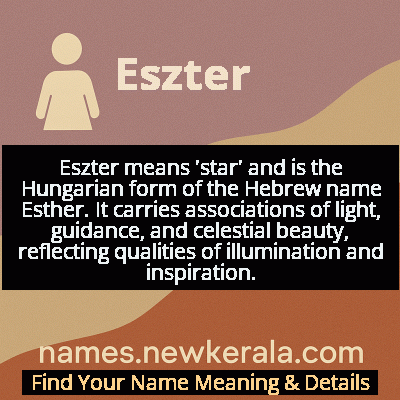Eszter Name Meaning & Details
Origin, Popularity, Numerology Analysis & Name Meaning of Eszter
Discover the origin, meaning, and cultural significance of the name ESZTER. Delve into its historical roots and explore the lasting impact it has had on communities and traditions.
Name
Eszter
Gender
Female
Origin
Hebrew
Lucky Number
3
Meaning of the Name - Eszter
Eszter means 'star' and is the Hungarian form of the Hebrew name Esther. It carries associations of light, guidance, and celestial beauty, reflecting qualities of illumination and inspiration.
Eszter - Complete Numerology Analysis
Your Numerology Number
Based on Pythagorean Numerology System
Ruling Planet
Jupiter
Positive Nature
Optimistic, inspirational, and creative.
Negative Traits
Scattered, exaggerating.
Lucky Colours
Yellow, gold, purple.
Lucky Days
Thursday.
Lucky Stones
Yellow sapphire.
Harmony Numbers
1, 2, 9.
Best Suited Professions
Arts, writing, communication.
What People Like About You
Creativity, optimism.
Famous People Named Eszter
Eszter Hámori
Chess Player
Hungarian Women's Chess Champion and International Master
Eszter Balázs
Actress
Award-winning Hungarian theater and film actress
Eszter Mattioni
Model
Internationally recognized Hungarian fashion model
Eszter Póka
Journalist
Influential Hungarian television presenter and media personality
Name Variations & International Equivalents
Click on blue names to explore their detailed meanings. Gray names with will be available soon.
Cultural & Historical Significance
The name's journey from ancient Persia to modern Hungary illustrates the rich cultural exchanges that have shaped Central European naming traditions. Eszter represents a bridge between Jewish heritage and Hungarian identity, embodying values of resilience, faith, and feminine power that resonate across cultures and generations. Its enduring popularity speaks to the universal appeal of its biblical origins while maintaining a distinctly Hungarian character that has made it a beloved choice for centuries.
Extended Personality Analysis
Women named Eszter are typically perceived as intelligent, graceful, and resilient individuals. They often possess strong leadership qualities combined with emotional intelligence, allowing them to navigate complex social situations with diplomacy and tact. Their natural elegance and poise often mask an inner strength and determination that emerges when facing challenges. Eszter's tend to be thoughtful decision-makers who consider multiple perspectives before acting, yet they can be surprisingly decisive when circumstances demand immediate action.
These individuals often exhibit a blend of traditional values and modern thinking, making them adaptable to various social contexts while maintaining their core principles. They value deep, meaningful relationships and are often the emotional anchors in their families and social circles. Their combination of wisdom, compassion, and practical intelligence makes them excellent problem-solvers and trusted advisors. While they may appear reserved initially, Eszter's reveal warmth, wit, and loyalty to those they trust, creating lasting bonds built on mutual respect and understanding.
Modern Usage & Popularity
Eszter remains a popular and well-established name in Hungary, consistently ranking among the top 100 female names. While its usage has become more moderate in recent decades compared to its peak popularity in the mid-20th century, it maintains a classic, sophisticated appeal. The name is experiencing renewed interest among educated, urban families who appreciate its historical depth and elegant sound. Outside Hungary, Eszter is occasionally used by Hungarian diaspora communities and those with appreciation for Central European names, though it remains distinctly Hungarian in character and pronunciation. The name's stability in popularity charts suggests it has transitioned from a trendy choice to a timeless classic that continues to appeal to new generations of parents.
Symbolic & Spiritual Meanings
Symbolically, Eszter represents illumination, guidance, and hidden strength—much like the stars it references. The name embodies the concept of light in darkness, suggesting someone who provides direction and hope during difficult times. It also symbolizes transformation and revelation, reflecting Queen Esther's journey from ordinary woman to savior of her people. The name carries connotations of royal dignity, strategic wisdom, and the power of feminine influence used for righteous purposes. Like a star that shines brightest in the darkest night, Eszter symbolizes resilience, moral courage, and the ability to rise to occasions of great importance while maintaining grace and composure under pressure.

